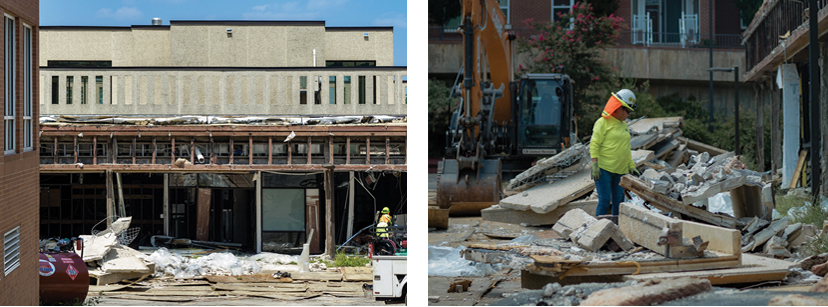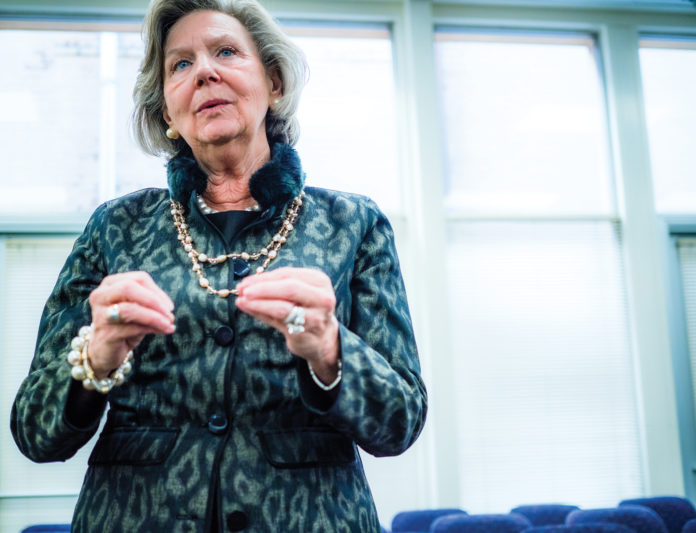Through calmness and confidence and the overcoming of crises, Alexander exits her yearlong League presidency having made a significant impact.
Karen Alexander’s year as the NC League President is bursting with the notion of legacy. For the Salisbury Mayor and architect by trade, it is something she’s used to. Alexander builds monuments. What she leaves behind stands for generations.
In this case, the testaments pursued, managed, and developed over the past 12 months are both physical and symbolic. She is overseeing a significant step forward for the League in constructing its new downtown building, after its former home was destroyed in the Raleigh fire of 2017. Less concrete, but equally if not more important, are her advances on the critical issues, which she calls the trifecta: COVID, racial equity, and the economic recovery of North Carolina communities. On top of all that is the forward momentum of the League, growing in both size and scope and navigating a new, pandemic-created landscape.
Alexander views it all through the perspective of opportunity. “Out of the worst possible disasters and challenges, if you’re looking at it from a positive lens, you start to see not just the devastation,” she said. It’s an approach that has yielded significant successes. Alexander has led the League through a period of significant refortifying—growing both in size and stature, reaching more members than ever, providing more services, and on the advocacy front, coming off its most successful legislative session in a decade.
As to her own legacy, it’s not something Alexander believes can be personally defined. Rather, that is for others to decide—others, who, with even just a quick glance, will see a series of significant issues successfully managed by a devoted public servant, creating long-lasting impacts that will in no small part define the NC League of Municipalities for years to come.
Mayor Alexander knew she was entering her year of League leadership at a trying time for North Carolina cities and towns, and she was intimately familiar with those challenges through her work back home in Salisbury, where she has served on the city council since 2013. Addressing the COVID-19 pandemic, Alexander was instrumental in coordinating regional partnerships, establishing health measures such as testing and vaccination clinics, and distributing support through different community programs and grant opportunities. Upon taking over as League president in 2021, Alexander leaned fully into those talents to continue that pattern of partnership, and led the organization into a fruitful period of virtual connectivity.
“I don’t think we understood how powerful it could be,” Alexander said of the League’s online approach employed throughout the past two years. Educational events and webinars have enjoyed record-high attendance, and in the face of rapidly changing situations, the ability to quickly meet with colleagues across the state to share ideas and experiences proved invaluable. “The availability of bite-size educational opportunities that would help our local leaders learn best practices and develop professionalism and leadership skills, without having to leave their home… It’s amazing. And it happened by necessity.”
 Alexander has been a mainstay in the development of many key League advancements. On top of the aforementioned educational courses, she has overseen the launch of the League’s racial equity program DIRECT, which stands for Diversity, Inclusion, and Racial Equity in Cities and Towns, and she also led the organization’s advocacy efforts during the 2021 legislative session (page 9). From a broader perspective, she has served in leadership roles at the League during what she believes to be a transformative period. Remembering the strategic sessions, the creation of the organization’s key values (“service, self-determination, inclusiveness, collaboration, and responsiveness”) and slogan (Working as One. Advancing All.), and the steady bolstering of services from advocacy to information sharing, Alexander sees an organization miles ahead of where it stood only a few years prior. Serving on the NCLM board since 2016, she has seen it firsthand, and she credits it to the people—to the local leaders from the mountains to the coast and every big and little town in between. Seen through the eyes of an architect, the result is a resilient structure.
Alexander has been a mainstay in the development of many key League advancements. On top of the aforementioned educational courses, she has overseen the launch of the League’s racial equity program DIRECT, which stands for Diversity, Inclusion, and Racial Equity in Cities and Towns, and she also led the organization’s advocacy efforts during the 2021 legislative session (page 9). From a broader perspective, she has served in leadership roles at the League during what she believes to be a transformative period. Remembering the strategic sessions, the creation of the organization’s key values (“service, self-determination, inclusiveness, collaboration, and responsiveness”) and slogan (Working as One. Advancing All.), and the steady bolstering of services from advocacy to information sharing, Alexander sees an organization miles ahead of where it stood only a few years prior. Serving on the NCLM board since 2016, she has seen it firsthand, and she credits it to the people—to the local leaders from the mountains to the coast and every big and little town in between. Seen through the eyes of an architect, the result is a resilient structure.
“When you put up a building, whether the building blocks are made of stone or granite, if you don’t have that cement between the building blocks, you don’t have a strong structure that can withstand the challenges that come along,” Alexander said. “It’s the same when you’re building organizations. It’s all of these wonderful pieces and parts that are coming from all these diverse minds and intelligence and personal experiences. That is the connective cement that holds it all together in a very strong way.”
Perhaps above all else, Alexander’s legacy will be tied to a literal building: the forthcoming League home, still in the early stages of its planning process.
Alexander has been a part of the League’s building committee since, as she recalls, the start—that start being the end of NCLM’s longtime downtown Raleigh offices, consumed in a five-alarm fire considered to be the city’s largest in nearly a century. The goal quickly became to recover and to rebuild. “It is an opportunity. It is the opportunity of a lifetime,” Alexander said. “And with that opportunity, we also have a huge responsibility. It is a legacy decision.”
At present, the damaged structure has been demolished, and the property is serving as a parking lot. Future hopes are far more upward-looking. Though those plans still require a great deal of development, Alexander is clear about the tremendous prospect the property offers not just the League, but the cities and towns of North Carolina as a whole. Even more than that, she’s clear about the experience it promises, too.
“This project becomes the visual for our commitment for growing and responsibly creating cities,” Alexander said. “This job will involve every aspect of what cities have to offer in terms of infrastructure and services. We’re going to experience as an organization why we advocate for the needs of cities. It will be the culmination.”
This level of thoughtfulness pervades Alexander’s entire approach to public service, as does the calmness with which she wields it. “Within that calmness, though, I’m very pragmatic,” Alexander said. “I like to listen. I like to hear every single voice. I don’t need attention or press or anything.
“I just like doing the work. That is my reward, to see it come together.”














